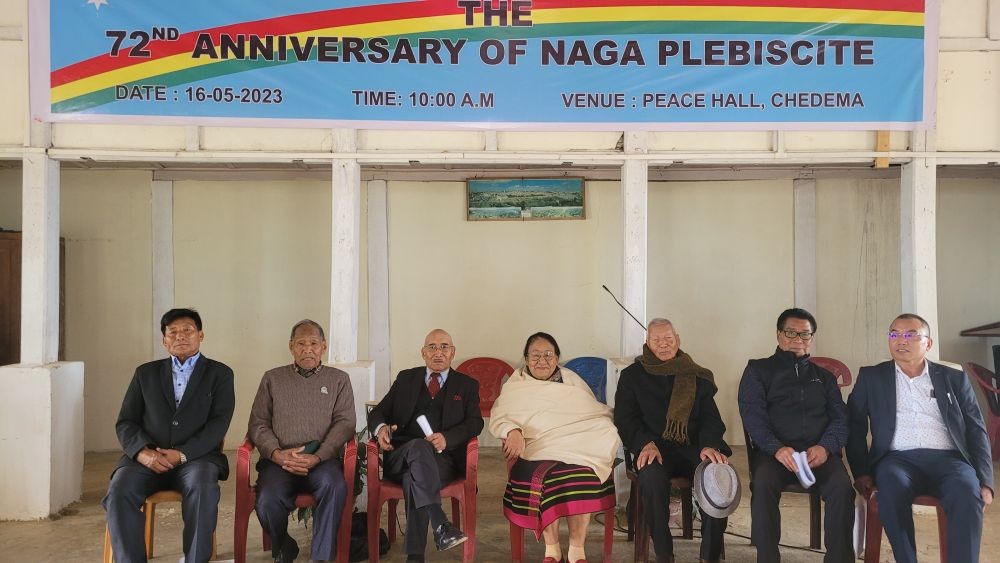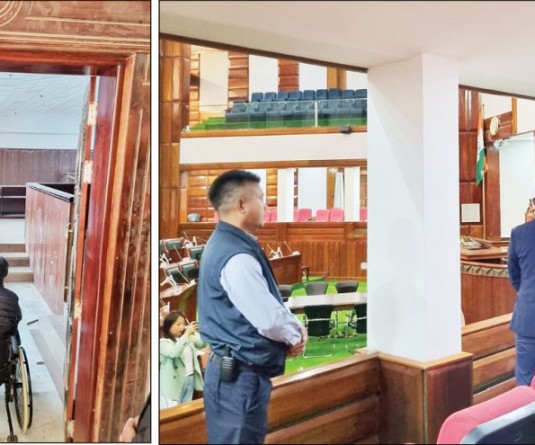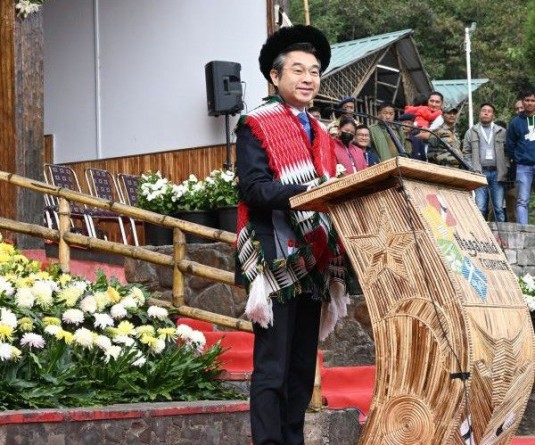FGN Kedahge Gen (Retd) Viyalie Metha with speakers and others during the observance of 72nd anniversary of Naga Plebiscite at at Chedema Peace Camp on May 16. (Morung Photo)

NNC observes 72nd anniversary of Naga Plebiscite
Our Correspondent
Kohima | May 16
The Naga National Council (NNC) today observed 72nd anniversary of Naga Plebiscite at Chedema Peace Camp under Kohima district, in the presence of Federal Government of Nagaland (FGN) Kedahge Gen (Retd) Viyalie Metha and several other National workers.
“On this auspicious Naga Plebiscite Day, the 16th May in 1951, we the Nagas as one body, mind and spirit under the NNC led by then president AZ Phizo unanimously expressed our self-determination to continue to live as a free and an independent nation," stated NNC President Adinno Phizo in her message, read out at the programme.
She further noted that the Day was not an event that happened out of the “whims and fancies of the Nagas” but backed by “legitimate historical facts since ancient times.”
Even during the British period, the Nagas had made their stand crystal clear in the 1929 Memorandum to the Simon Commission, she asserted.
Adinno further pointed out that after the Nagas declared “our Independence on the 14th of August 1947,” the NNC conducted a national Plebiscite “to reinforce, affirm and clear any doubts and aspersions” of the declaration with “observers from our neighboring country, India.”
“This Plebiscite decided our destiny to continue to live as a free and sovereign nation with the result of 99.9%,” she stated.
Despite the Plebiscite and historic legitimacy of Nagaland, the NNC President maintained that “India chose to invade Nagaland and the Indo-Naga war ensued.”
“To this day it baffles one to think that India, the largest democracy, would do such a thing that is completely antithetical to the democracy she professes,” she added.
According to Adinno, India has a legitimate right to claim Pakistan and Bangladesh due to historical, racial and cultural reasons. “However, to claim Nagaland which never had any political, cultural, racial or historical relation with India as part of India is a shameful act and an insult to logic and reason.”
To this end, Adinno stated that India continues to “illegally occupy our beloved country and toys and tests our peaceable patience while making Nagaland her geopolitical playground.”
Today, if India in particular, and the world in general, cannot see the truth and take it for what it is, then the rights of all sovereign nations are at peril from the likes of bullying larger nations like India, she stated.
Accordingly, she stressed that the Plebiscite must be upheld even more strongly with an indomitable spirit of patriotism which “we Nagas do not lack.”
For her, the Plebiscite is not a mere expression of what the Nagas want but a “sacrosanct covenant of what the Nagas were and are and will continue to be, and that is- Nagaland: a Sovereign Nation.”
'Similar' to Israelites
Also speaking on the occasion, Sano Vamuzo recalled that Plebiscite was conducted in Kohima when she was only 11 years old. “I was too young to know anything about it, but as I grew up I came to understand what the Naga struggle of which the Plebiscite was a vital part meant for all the Naga people,” she said.
Maintaining that the Naga story is ‘very much similar’ to that of the Israelites, Sano noted: “Today, everyone is fighting out of selfishness, greed, jealousy, hatred, etc. It took the Israelites 2000 years to get their Independence (1948)."
“It was because of their disobedience that it took so long for them.”
While noting that the Naga family is badly divided today, she implied that “only the Word of God can lead us to the right path” and called for reflecting on it.
Plebiscite as basis for talk?
“Can Nagas have another Plebiscite? No, because the objective of Plebiscite 1951 was not to decide whether or not to join the union of India. It was to affirm that we were independence and will stay independent,” Dr K Hoshi, meanwhile, contended.
In the context or from the perspective of mandate by physical voting, the votes reflected the mandate of erstwhile Naga Hills district of Assam only, he maintained.
“There was no mass participation by Nagas in Manipur, Assam and Arunachal Pradesh. The necessity for Plebiscite did not arise for Free Nagas as they were not under the British control or occupation up to her departure from her SE Asian Empire,” he claimed.
Accordingly, he argued that if the Plebiscite is used as the basis for talk in the context of actual physical voting, there is possibility that India may push for solution exclusively for Naga Hills district (Nagaland State).
Dr Hoshi said that Plebiscite ratified August 14, 1947 declaration and it encompassed all Nagas and their territories between India, Myanmar and China.
The Plebiscite can be the basis for talk if this historical fact is honoured, he added.
Earlier, the programme was chaired by Kolezo Chase, CEC- cum- spokesperson NNC while Rev Phomlee Van, Pastor Kohima Phom Baptist Church prayed for the programme.




